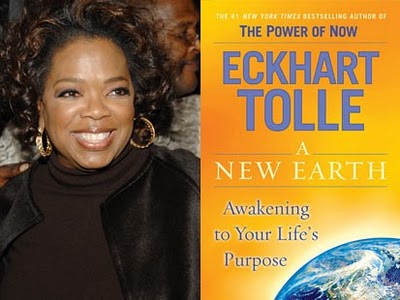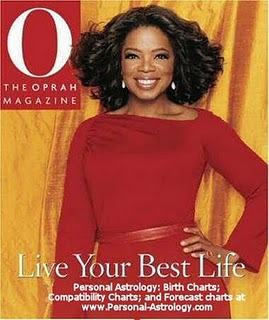
I ran across an fascinating interview on Salon.com with Kathryn Lofton–Assistant professor of American studies and religious studies at Yale– who is the author of Oprah: The Gospel of an Icon. The interview is entitled “Worshiping at the church of Oprah Winfrey.”
The interview begins, “In the past quarter-century Oprah has become shorthand for self-help: a spiritual guide, a confessor and a warm shoulder for her adoring American public. Now in the final season of her revolutionary daytime talk show, Oprah’s pronouncements have become the Word to live by for a staggeringly diverse audience. In fact, you could argue she is a religious leader for an America increasingly skeptical about organized religion.” Indeed. This is exactly the premise of Professor Lofton’s book. Here are some excerpts from the interview:
What was it about Oprah that made you think of her in the context of American religious history?Within these very corporate formats of daytime television, extraordinary forms of suffering were being confessed to and described. There’s a great book about Oprah by Eva Illouz, “Oprah Winfrey and the Glamour of Misery,” and Illouz points out something that I dig into, and that is the strange way in which the extremity of human despair — not merely estranged spouses, we’re talking stories of people coming home and seeing that their spouse has murdered all their kids and then themselves — are being dealt with in the same way as these topics that are seemingly shallow. Good glasses for a spring party, best new strategies for boyfriend wear. This exposure of human need at 4 p.m. on a weekday afternoon made me think, “What is this thing?” We’re so accustomed now to reality programming and a whole spate of shows spun off from Oprah, but, as a scholar of a religion, I think it’s one of our jobs to be cued into how people manage pain, and the idea of evil, or whether or not we live in a just world.
What is Oprah’s religious background?Oprah talks about a Baptist church that her grandmother took her to in Mississippi. She tells an anecdote about how she was a successful young churchgoer and was asked to preach in front of that audience and was a very good girl who memorized scriptural passages. Then in her adulthood, she has some criticism of male figures in the church and the dominance of male authorities and it seems that by the time we get to the ’90s, it’s circulating that she’s no longer a member of the church but she continues to use Christian idioms in her conversational speech. She says, “Jesus lives.” She’ll say, “Amen.” She’ll occasionally sing lines from obviously Protestant hymns, but she claims now that she’s no longer interested in organizational religion, and she’s more interested in a personal relationship with God. Indeed, she has around her a large collection of spiritual purveyors of a wide variety: Buddhist, Hindu, Unity Church. Every flavor of the contemporary, spiritual rainbow is welcomed into her studio.
Her gospel — her good news — is you. The good news is that if you take hold of your life; if you discover (as she says) your best life, anything is possible. Of course, this good news is translated not only through her exhibition of you — you through her audience members, guests, columnists, message board commentators — but also through the unending rehearsal of her. The good news is her revelations about her best life — lived, she says, in service to you.
Why do you think so many people who shun religion are comfortable looking to Oprah for “spiritual guidance”?Precisely because she says she doesn’t seem typical in her authority. Because she represents — in her race and gender and origins — being utterly outside established power. Also, she isn’t preaching to sell you something singular. She says, over and over: I am here to let you be you. My answers are mine, and they made my struggling life something fantastic to share. You’re not joining a group, you’re just finding your inner fabulous. This is appealing to people who associate religion with controlling authority, rigid dogma or social adherence. This is a religion for those who don’t want to be religious, but want to feel revelation.

COMMENTS
3 responses to “Oprah and the Real American Idol”
Leave a Reply
















One glaring difference between Oprah's gospel and Christ's is that Oprah's apparently renders a person completely insensitive to the fact that it's staggeringly egotistic to willfully put your photograph and name on the cover of a national magazine every month. In Oprah's gospel, such a move is a feature, not a bug.